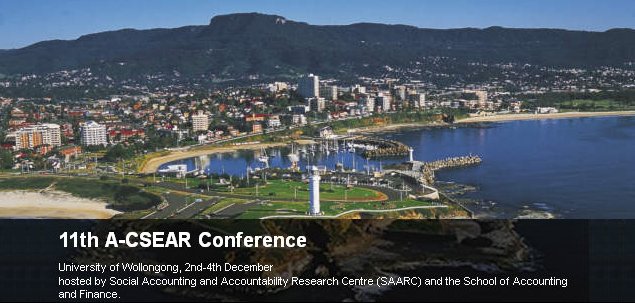Location
Bld 67.201
Start Date
3-12-2012 12:00 PM
End Date
3-12-2012 12:30 PM
Description
Purpose – This paper explores the perceptions of potential users about water accounting reports prepared under Standardised Water Accounting (SWA), and reflected in the Exposure Draft of Australian Water Accounting Standard 1 (ED AWAS 1). One of the shortfalls in the development of ED AWAS 1 is the lack of a proper study on the information needs of potential users of water accounting reports and this research paper attempts to fill in this gap. Efficient and effective water management is an important element in alleviating water crises caused by misuse of water resources. Design/methodology/approach – The theoretical framework adopted in this paper is Accountability. This concept is explored in depth across three main ideas: clarity of relationship, transparency and power. A mixed method approach was utilised in which a questionnaire was administered to users with water-related interests in five different water-related seminars. The results yield to 36 usable responses. Most questions were closed ended with possible responses ranging from either a five-point Likert scale or a ‘Yes/No/Undecided’. The qualitative phase involved the analysis of secondary by examining public submissions to the Water Accounting Standards Board on ED AWAS 1. Findings – The majority of respondents perceive that it is useful to use a standard system to prepare water accounting reports (applying SWA). Moreover, the majority of potential users are unsure about the effectiveness of such reports in discharging the accountability of water managers, and a significant number of stakeholders were unaware of its development. After analysing the submissions based on the integrated accountability model, it was found that accountability is unlikely to be fully realised. Submissions reflect the perceptions on potential users of General Purpose Water Accounting Reports (GPWAR).
Stakeholders' Perspectives on Standardised Water Accounting Reports: Accountability Perspective
Bld 67.201
Purpose – This paper explores the perceptions of potential users about water accounting reports prepared under Standardised Water Accounting (SWA), and reflected in the Exposure Draft of Australian Water Accounting Standard 1 (ED AWAS 1). One of the shortfalls in the development of ED AWAS 1 is the lack of a proper study on the information needs of potential users of water accounting reports and this research paper attempts to fill in this gap. Efficient and effective water management is an important element in alleviating water crises caused by misuse of water resources. Design/methodology/approach – The theoretical framework adopted in this paper is Accountability. This concept is explored in depth across three main ideas: clarity of relationship, transparency and power. A mixed method approach was utilised in which a questionnaire was administered to users with water-related interests in five different water-related seminars. The results yield to 36 usable responses. Most questions were closed ended with possible responses ranging from either a five-point Likert scale or a ‘Yes/No/Undecided’. The qualitative phase involved the analysis of secondary by examining public submissions to the Water Accounting Standards Board on ED AWAS 1. Findings – The majority of respondents perceive that it is useful to use a standard system to prepare water accounting reports (applying SWA). Moreover, the majority of potential users are unsure about the effectiveness of such reports in discharging the accountability of water managers, and a significant number of stakeholders were unaware of its development. After analysing the submissions based on the integrated accountability model, it was found that accountability is unlikely to be fully realised. Submissions reflect the perceptions on potential users of General Purpose Water Accounting Reports (GPWAR).


